Keyword Research for Busy Small Business Owners
In last week’s post I demonstrated WHY keyword optimization still matters, especially for small business owners. In this post I’ll cover HOW you can do your own effective keyword research in under 2 hours!

Copyright (c) 1999-2013 Jamie Zawinski <jwz@jwz.org>
NOTE: This post focuses on keyword research for organic SEO optimization, not for paid ad campaigns, which is quite different.
How to Perform Effective and Efficient Keyword Research for your Small Business Web Site
One of my goals is to help small business owners perform effective online marketing in as little time as possible.
When it comes to choosing keywords, you could spend weeks on it. You could invest in a dozen different tools, each of which will give you a few more ideas or a slightly different take. You could pay an expert to do all this for you (which could make good sense if you don’t have the time or interest).
But you can also do keyword research yourself and get 80% of the results for just 20% of the effort. Here’s how, using only a spreadsheet, free Google tools, and your own experience from running your small business.
Example
I’m going to work through a real example as we go so you can see the process in action.
I’m going to pretend that I’m starting a new business that delivers “PC repair over the internet”, and I want to ultimately choose keywords with which I can best optimize my web site for attracting my target customers.
Step 1: Create a broad list of keyword candidates
We’ll start our keyword research by generating a list of candidate keywords using your own business knowledge. Ask yourself:
- What do you think are your business’ most valuable keywords?
- How would you describe the customer problems you are solving?
- How do your customers talk about your product or service to others in blogs, articles, forums and social media?
- What do you think your ideal customers might type into Google when looking for a product or service like yours?
- What keywords do your competitors use on their sites and in their ads?
You can expand this list using a thesaurus to create close variations.
If you use Google Analytics you can further expand this list by going to Traffic Sources -> Search Engine Optimization -> Queries, where you will find the actual search terms that have triggered your site to show in Google search results. Capture those keywords that you think are relevant, and add them to your list. You can get similar information from any PPC campaigns you might be running.
Now we’re going to really flex Google’s muscle to dramatically expand your list of prospective keywords and capture all the relevant data we’ll need for filtering down our keyword list later.
Go to the Google Adwords Keyword Tool. You’ll want to sign in to get the full data set we’ll need. If you don’t yet have an account, it’s free to set up.
Now do the following:
- In the “Word or Phrase” field at the top of the main section, paste all of the keywords you’ve generated so far
- Leave the “Website” and “Category” fields blank
- Do not click “Only show ideas closely related to my search terms”
- Under “Match Types” in the left column, select “phrase”
- Click “Search”
#3 is important because we’re looking for creative ideas similar to our existing keywords but not limited to the same terms. However, in some cases you might get more relevant results if you check the box, so you may want to experiment.
#4 is important because most small business web sites have low search engine authority (meaning few high quality back links) and so will have a very difficult time ever ranking highly in search results for broad match terms. Therefore, searching on phrase match terms will provide a better picture of your expected traffic and competition. (Learn about keyword matching options here.)
Example
Below is a screen shot of the results after doing the above with my starting list of keywords.
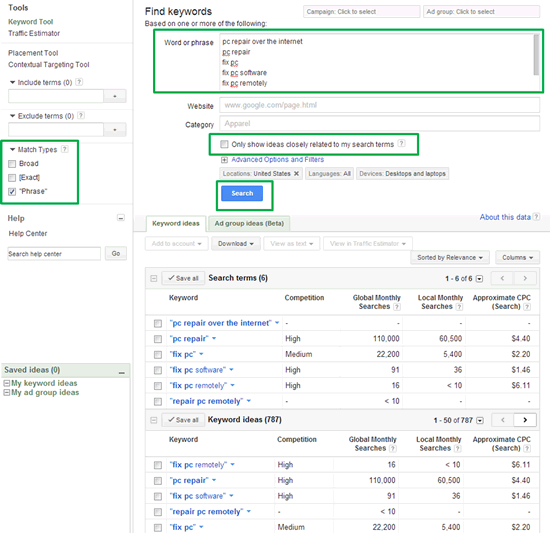
Now we’ll export the full keyword list to a spreadsheet, where we can more easily manipulate the data.
First, make sure you are displaying the columns “Local Monthly Searches” and “Approximate CPC (Search)”. If either is not displayed, click the “Columns” pull-down menu to select them.
You can download the other columns of data, too, if you want, but we’ll ignore them.
(“Competition” is a normalized value showing the number of advertisers worldwide bidding on each keyword relative to all keywords across Google. This data can be misleading because right now we’re looking to optimize keywords for organic search ranking, where the levels of competition can differ significantly. We’ll also ignore “Global Monthly Searches” because my fictitious business only serves U.S. customers.)
Click Download -> All Search Results, and choose the “CSV for Excel” format.
Step 2: Prune your keywords based on essential criteria
Now that we have an enormous list of prospective keywords for our business, we need to cut it down to size, eliminating those keywords that won’t be as valuable to us.
Ultimately we want to choose keywords that have the following vital characteristics:
- Moderate search traffic
- Low competition
- High commercial value (I’ll explain later)
- High relevance to your small business
A) Filter out keywords with too little traffic
There’s no point in trying to rank #1 in Google for keywords that won’t bring you any traffic.
The #1 organic search spot will receive clicks from less than 25% of visitors. The #2 spot will get closer to 15%, and so on down the line.
This means that if you rank #1 for a keyword that gets 1,000 local monthly visits, you can expect to see a little over 200 of them, or maybe 7 per day. Of those, only a portion will become your customers.
Example
For this reason, we’ll go ahead and delete all the keywords for which Local Monthly Searches is less than 1,000. (You can tweak this cutoff point as you see fit.)
I’ll use the Excel Data -> Sort function to sort by this column of values and delete all those with values less than 1,000. This includes those for which there is no data (as indicated by a “-“).
Here are some of the spreadsheet entries I’ll delete.
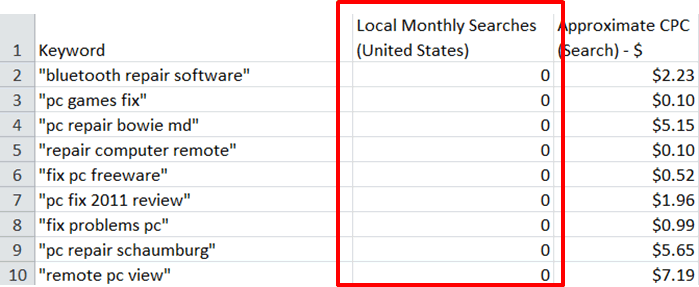
NOTE: Keep this deleted list if you plan to run an Adwords campaign. It can be valuable to mine this “long tail”. But for your primary web site SEO you’ll want to focus on higher traffic keywords.
B) Filter out keywords with too much traffic
On the other end of the scale, there’s no point in a small business going after highly popular keywords. You’ll never beat out the more established companies that are dominating those search results.
When traffic is your goal, it’s far better to get on Google’s page 1 for a lower traffic term than on Google’s page 2 (or 10, or 100) for a higher traffic term.
You’ll notice that these high traffic terms are largely very generic terms. So it wouldn’t do you much good to rank highly for them anyway because the traffic will not be well targeted for your service.
C) Filter out keywords with too little commercial value (Step 1)
Now we turn to the Approximate CPC (Search) column. This is the average amount that Adwords advertisers are spending for a single click. Even though we are choosing keywords for organic search placements, this data is highly useful in indicating general commercial value.
Example
I see that the terms “pc doctor” and “remote support” both have 18,100 Local Monthly Searches. However, the average CPC for “pc doctor” is only $1.76, while the average CPC for “remote support” is a whopping $18.55.
If we assume that these advertisers are behaving rationally (a fairly safe assumption given the large number of advertisers on Google), this means that a visit from someone searching for “remote support” is roughly 10x more valuable commercially than a visit from someone searching for “pc doctor”.
Indeed, a Google search for these two terms reveals the reason. “pc doctor” returns a lot of free computer check-up tools in the organic search results. It’s hard to sell a product (even a great one) when there are so many decent ones available for free. Conversely, “remote support” returns a host of companies who are heavy hitters in the desktop services space — offering highly differentiated high-value services that you can’t get from a free download.
We will ignore keywords with low commercial value by filtering out those with an Average CPC of less than $4.00 because qualitatively for my keyword list that looks to be a reasonable cutoff for commercially valuable keywords in this space. (Again, tweak this value if you see reason to).
What do I mean by “commercially valuable”? You’ll notice that we’ve eliminated most or all of the keywords that contained “free”, “cheap”, etc., which is good. I’m not going to make much money by fixing PCs for free!
We’ve also eliminated a lot of “how to” and related terms where the searcher is looking for information, not to necessarily buy a product or service.
We want to target “buying” signals, not “browsing” signals.
Example
Here are some of the entries I’ll delete due to low commercial value.
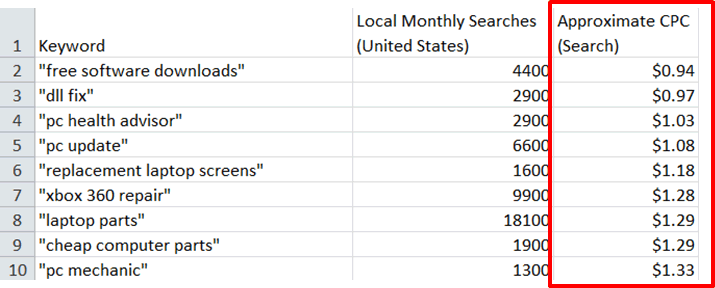
After these 3 rounds of filtering I’ve reduced my keyword list from 793 candidates to 82.
NOTE: Every time I apply a filter I scan the keywords being eliminated as a sanity check. If there are any that you think should be truly valuable, save them from deletion and we can re-evaluate them at the end.
D) Filter out keywords with too little commercial value (Step 2)
Now we’ll do one more pass with commercial value in mind. This time we’ll create a new column that is equal to (Local Monthly Searches) * (Average CPC) * 0.2.
This will give a rough value of expected income available for the company that appears in the #1 organic search placement.
(Don’t pay much attention to the exact dollar value. It’s the relative values that are important.)
Sorting on this new column we again see a large group of keywords to delete — primarily those with both low Local Monthly Searches and low Average CPC.
Example
Scanning the low end of the list, I’m going to filter out all those with a combined value of less than $3,000 as I can see, qualitatively, that they don’t appear highly relevant or valuable for my business.
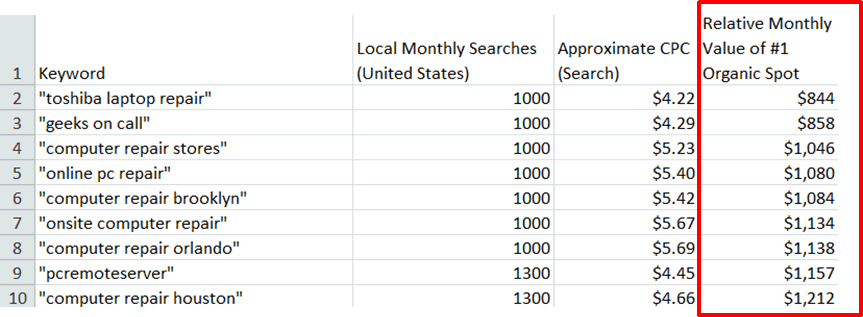
Now I’m down to 40 keywords — a manageable size for some additional manual culling.
E) Delete keywords that are not relevant for your business
Relevance can come in many forms. An easy one is location. Delete all keywords that include a city or region that you don’t serve. Or, if you serve the entire U.S., as in my case, delete all keywords that contain a city or region. Such keywords will almost invariably have greater competition due to the local focus, plus searchers specifying a city or region are likely looking for local support, which I’m not providing.
Also delete any keywords that don’t accurately reflect your offering or are too vague for your offering.
Example
In my case I’m deleting, among others:
- “computer help” (too vague)
- “hard drive repair” (not part of my service)
- “access pc” (not someone in need of repair work)
- “computer repair las vegas” (someone likely wanting local support)
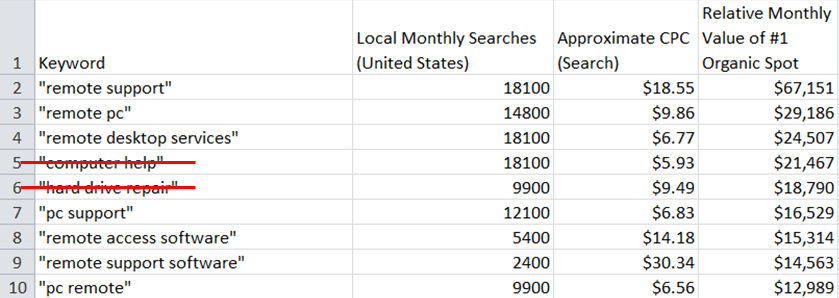
I’m now down to 18 keywords — a manageable size for the final very manual filtering step.
F) Delete keywords that have too much organic search competition
The data we downloaded from the Google Adwords Keyword Tool includes competitive data only for paid ad placements. The competition is often quite different for organic placements. So we need to add in that data from another source.
Not surprisingly, that source is again Google! This time we’ll go right to www.google.com to use their search interface directly.
We’ll use a couple of special Google search operators called [intitle] and [inanchor].
(Ignore the brackets — I’m just using them for readability).
Searching for [intitle:”keyword”] returns all pages where “keyword” is in the page title. The title is what you see displayed at the top of your browser and in the first line of your Google Search result listing.
Searching for [inanchor:”keyword”] returns all pages where “keyword” is in the anchor text of a link that points to that page from another site.
(You can see all special Google search operators in this handy guide.)
We’re going to combine these operators and perform the following search for each remaining keyword: [intitle:”keyword” inanchor:”keyword”]
Example
I’ll type the following into a Google search box as a single query:
inanchor:”remote support” intitle:”remote support”
And then we’ll record the number of results returned into a new column in the spreadsheet.
This number is a reasonable indicator of the level of organic search competition because results that meet both of these criteria tell us one of two things. Either:
- Someone intentionally optimized the page for that keyword, or
- The page is so valuable for that keyword that other sites are naturally linking to it using the same keyword
Having a keyword in both the title and the anchor text of a link to the page will already encourage Google to rank the page more highly for that keyword, so those pages are harder to beat.
But beyond that, this combination is an indication of additional SEO strength due to the two possible cases just mentioned. It will be difficult to compete for keywords that return a large number of pages that meet this criteria.
Example
Sorting by this new column and scanning the results, I’m going to delete all keywords for which this InTitle and InAnchor search return more than 50,000 pages — just too much competition for my budding company.

G) Delete keywords that have too much strong competition on page 1 of Google
This step is not critical because the extra value it adds can be questionable.
The idea is that the previous filtering we’ve done is all well and good, but our ultimate objective is to rank on page 1 of Google for our selected keyword.
If page 1 of Google is completely dominated by well-established high authority sites with content targeted for the keyword, then we’ve got a huge uphill battle to face.
However, the filtering we’ve done is very likely to eliminate keywords for which there is no achievable space on page 1. Maybe you can’t get into the top 3 spots. But the top 5 or 7? Sure.
Also, this isn’t always what it seems. Many of those top results will come and go over time. Sites change. Pages change. Google’s algorithm changes (almost daily!). If you’ve applied all the other filters, there’s a good chance you can eventually get your site on page 1 regardless of how page 1 looks today.
However, if you are interested in performing this additional competitive analysis, let me know in the comments section below and I’ll cover it in another post. It’s too complicated to cover here and requires additional tools. (Detailed competitive analysis is a also a good area for which to consider hiring a professional.)
Step 3: Make your selection
We’re almost done. Now it’s up to you.
Example
For my fictitious company, I’ve whittled my list of 793 potential keywords down to 7 with just an hour or so of work.
Talk about efficient keyword research!
Here they are:

To recap, these keyword finalists have the following sterling qualities:
- Moderate search traffic
- Low competition
- High commercial value
- High relevance to your small business
All that remains is to make your final selection.
My best advice here is to choose keywords that resonate with you.
The keywords you select will drive your marketing strategy for a long time to come. Choose keywords that roll off the tongue well, that work well in various contexts (both verbal and written), and that you can be proud of as defining your company.
Of course, make sure your keyword selections accurately represent your product or service and target your ideal customers.
You don’t need to choose just one keyword. You might optimize several key pages of your web site, choosing one keyword for each. A given page can only be fully optimized for a single keyword, but you can also choose 1-2 secondary keywords for the same page.
See these other blog posts to learn:
- How to map keywords to your web pages
- How to perform on-page search engine optimization for your keywords
And if you choose more than one keyword, there can be value in choosing keywords that form a related group. Closely related keywords can help boost each other in search engine rankings.
Example
In my case, I might choose the combination of “remote tech support” and “remote desktop support” as a primary and secondary keyword for my home page. These two related keywords have the lowest levels of search traffic but also the lowest levels of competition.
Or I might choose “computer repair company”, the keyword with the highest relative commercial value, for my home page and create two important supporting pages that I optimize for “computer troubleshooting” and “computer virus removal”.

There are many possibilities for choosing keywords. The toughest part is up to you — making the final decisions. No pressure!
FINAL CONSIDERATIONS:
- If any results seem non-intuitive, do a direct Google search and evaluate the results returned to figure out why.
- Search engines ignore “stop words” (“a”, “the”, “for”, etc.), so choose phrases that read the best.
- Singulars and plurals are largely treated the same, and ranking well for one usually means you rank well for the other. Confirm this in your data, and then choose the one with higher traffic.
- Don’t bother trying to rank for misspellings. Google keeps getting better at fixing searchers’ misspellings on the fly.
- One final sanity check you can do is to enter each keyword into the Google Trends tool. This will show you long-term trends for searches for each keyword. The main thing to look for here is to see if any of the keyword finalists are either exploding in popularity or on the decline. If the former, you could get in early on a keyword that will bring you more and more traffic over time. If the latter, well, best not to ride along in a sinking ship.
- If you’re not happy with your final keyword candidates, or if you’re just itching to be “extra sure”, copy your finalists back into the Google Adwords Keyword Tool as your new seed list and repeat the above process. More often than not you’ll end up with the same list, but it might make you feel better.
Conclusion
In this post I’ve shown you how to perform effective and efficient keyword research for your small business web site.
We quickly generated a massive amount of keyword ideas, filtered them down to the most promising few finalists, and then made our final selections. And we did all this keyword research using highly reliable free tools (thank you, Google!), without needing to hire an expert, and without needing to work through the weekend.
Wait a minute…
What about all the other tools, free and paid, available to help with keyword research?
They have some advantages in additional analysis capabilities, especially when it comes to detailed competitive research. However, all of them also have a dramatic shortcoming — they don’t use Google’s database for all the data we need. Not because they don’t want to, but because they can’t.
Google doesn’t allow high-volume queries of its database. In fact, I had to fill out a captcha while I was generating competitive data in the example above in order to assure Google that I’m a human so that I could proceed.
What does that mean? It means that if you use other tools for keyword research, you’d still want to correlate the results to Google data anyway. Why? Because that’s the search traffic you want, so it’s the only database that really matters in the end.
Why not save yourself expense and extra work and just stick with Google? This is definitely the 80/20 solution for keyword research.
So now you have the optimal keywords for your small business in the palm of your hand. What’s next?
The next step is to optimize your small business web site for these valuable keywords.
- How to map keywords to your web pages
- How to perform on-page search engine optimization for your keywords
Got additional suggestions? Got a difference of opinion? I’d love to hear from you!
And I’d especially love to hear your results if you follow the above process for your own small business.

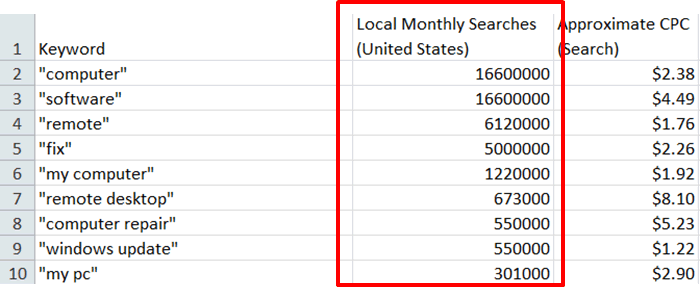

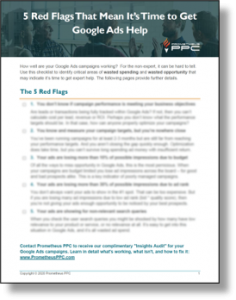
This is a fabulous go-to article for someone who wants to understand their online audience even further, and cater to their needs with helpful website content. Thanks Andrew!
You’re very welcome, Tammy. I hope you took away some useful nuggets.
I definitely did, and shared it on Twitter so more people can access these great suggestions!